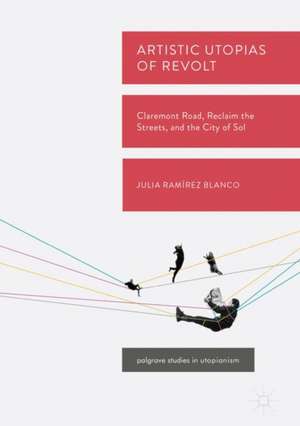Artistic Utopias of Revolt: Claremont Road, Reclaim the Streets, and the City of Sol: Palgrave Studies in Utopianism
Autor Julia Ramírez Blancoen Limba Engleză Hardback – 22 mar 2018
This book analyses the aesthetic and utopian dimensions of various activist social movements in Western Europe since 1989. Through a series of case studies, it demonstrates how dreams of a better society have manifested themselves in contexts of political confrontation, and how artistic forms have provided a language to express the collective desire for social change.
The study begins with the 1993 occupation of Claremont Road in east London, an attempt to prevent the demolition of homes to make room for a new motorway. In a squatted row of houses, all available space was transformed and filled with elements that were both aesthetic and defensive – so when the authorities arrived to evict the protestors, sculptures were turned into barricades. At the end of the decade, this kind of performative celebration merged with the practices of the antiglobalisation movement, where activists staged spectacular parallel events alongside the global elite’s international meetings. As this book shows, social movements try to erase the distance that separates reality and political desire, turning ordinary people into creators of utopias. Squatted houses, carnivalesque street parties, counter-summits, and camps in central squares, all create a physical place of these utopian visions
| Toate formatele și edițiile | Preț | Express |
|---|---|---|
| Paperback (1) | 381.00 lei 6-8 săpt. | |
| Springer International Publishing – 15 ian 2019 | 381.00 lei 6-8 săpt. | |
| Hardback (1) | 390.84 lei 6-8 săpt. | |
| Springer International Publishing – 22 mar 2018 | 390.84 lei 6-8 săpt. |
Preț: 390.84 lei
Nou
Puncte Express: 586
Preț estimativ în valută:
74.78€ • 78.09$ • 61.76£
74.78€ • 78.09$ • 61.76£
Carte tipărită la comandă
Livrare economică 15-29 aprilie
Preluare comenzi: 021 569.72.76
Specificații
ISBN-13: 9783319714219
ISBN-10: 331971421X
Pagini: 198
Ilustrații: XVI, 187 p. 49 illus., 43 illus. in color.
Dimensiuni: 148 x 210 mm
Greutate: 0.48 kg
Ediția:1st ed. 2018
Editura: Springer International Publishing
Colecția Palgrave Macmillan
Seria Palgrave Studies in Utopianism
Locul publicării:Cham, Switzerland
ISBN-10: 331971421X
Pagini: 198
Ilustrații: XVI, 187 p. 49 illus., 43 illus. in color.
Dimensiuni: 148 x 210 mm
Greutate: 0.48 kg
Ediția:1st ed. 2018
Editura: Springer International Publishing
Colecția Palgrave Macmillan
Seria Palgrave Studies in Utopianism
Locul publicării:Cham, Switzerland
Cuprins
1. Introduction: Art as Language, Utopia as Discourse.- 2. Activism as a Place: The British Anti-Roads Movement and the Squatted Street of Claremont Road.- 3. The Reclaim the Streets Protest Parties in London.- 4. Interlude: The Globalization of the Aesthetics of Protest.- 5. Disobedience as an Urban Form: The Acampadasol in Madrid.- 6. Notes Towards a Conclusion.-Chronology of Events.- Glossary.- Index.
Notă biografică
Julia Ramírez-Blanco is Lecturer at Barcelona University, Spain. Her work revolves around the relationships between art, utopia and activism. Researching in various institutions in Europe and the USA, her publications have appeared in English, French, Italian and Spanish in various co-authored books and journals.
Textul de pe ultima copertă
This book analyses the aesthetic and utopian dimensions of various activist social movements in Western Europe since 1989. Through a series of case studies, it demonstrates how dreams of a better society have manifested themselves in contexts of political confrontation, and how artistic forms have provided a language to express the collective desire for social change.
The study begins with the 1993 occupation of Claremont Road in east London, an attempt to prevent the demolition of homes to make room for a new motorway. In a squatted row of houses, all available space was transformed and filled with elements that were both aesthetic and defensive – so when the authorities arrived to evict the protestors, sculptures were turned into barricades. At the end of the decade, this kind of performative celebration merged with the practices of the antiglobalisation movement, where activists staged spectacular parallel events alongside the global elite’s international meetings. As this book shows, social movements try to erase the distance that separates reality and political desire, turning ordinary people into creators of utopias. Squatted houses, carnivalesque street parties, counter-summits, and camps in central squares, all create a physical place of these utopian visions
Caracteristici
Examines expressions of utopian ideals by social activists in Western Europe since the late twentieth century Analyses the aesthetic components of utopian space through a series of case studies Argues that the fall of the Berlin wall has significantly impacted the political and cultural imagination of Western Europe













